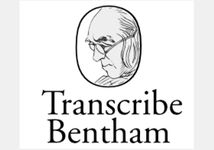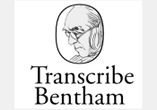Transcribe Bentham: Difference between revisions
Jump to navigation
Jump to search
No edit summary |
No edit summary |
||
| Line 9: | Line 9: | ||
|field_cs_subject_areas=other | |field_cs_subject_areas=other | ||
|field_fields_of_science=Literature | |field_fields_of_science=Literature | ||
|field_project_description=Transcribe Bentham is a an award-winning participatory project based at University College London. Its aim is to engage the public in the online transcription of original and unstudied manuscript papers written by Jeremy Bentham (1748-1832), the great philosopher and reformer, via a transcription interface based on a customised [MediaWiki]. | |field_project_description=Transcribe Bentham is a an award-winning participatory project based at University College London. Its aim is to engage the public in the online transcription of original and unstudied manuscript papers written by Jeremy Bentham (1748-1832), the great philosopher and reformer, via a transcription interface based on a customised [[MediaWiki]]. | ||
"Transcribe Bentham emerged out of initial discussions between Professor Philip Schofield, the Director of the Bentham Project, and Martin Moyle of UCL Library Services, regarding the production of a digital Bentham resource for a forthcoming Arts and Humanities Research Council funding call. Martin proposed the establishment of a resource to facilitate crowdsourced transcription of the Bentham Papers, and a potential partnership between the Bentham Project, UCL Library Services, UCL’s Centre for Digital Humanities, and the University of London Computer Centre. After an initial meeting between Professor Schofield, Martin, Dr Melissa Terras (UCL DH), and Richard Davis (ULCC), hosted by Library Services, the project consortium was formed."(About Us, official project page) | "Transcribe Bentham emerged out of initial discussions between Professor Philip Schofield, the Director of the Bentham Project, and Martin Moyle of UCL Library Services, regarding the production of a digital Bentham resource for a forthcoming Arts and Humanities Research Council funding call. Martin proposed the establishment of a resource to facilitate crowdsourced transcription of the Bentham Papers, and a potential partnership between the Bentham Project, UCL Library Services, UCL’s Centre for Digital Humanities, and the University of London Computer Centre. After an initial meeting between Professor Schofield, Martin, Dr Melissa Terras (UCL DH), and Richard Davis (ULCC), hosted by Library Services, the project consortium was formed."(About Us, official project page) | ||
|field_purpose_of_project=Digital images of Jeremy Benthams’ published manuscripts are transcribed by volunteers to ensure long term preservation of the Philosophers works. | |field_purpose_of_project=Digital images of Jeremy Benthams’ published manuscripts are transcribed by volunteers to ensure long term preservation of the Philosophers works. | ||
| Line 16: | Line 16: | ||
|field_contact_person_URLs=transcribe.bentham@ucl.ac.uk | |field_contact_person_URLs=transcribe.bentham@ucl.ac.uk | ||
|field_team_location=University College London, 26 Gordon Square, London, WC1. | |field_team_location=University College London, 26 Gordon Square, London, WC1. | ||
|field_participant_task_description=The volunteer selects a manuscript, and is presented with a manuscript image alongside a free-text box, into which he or she enters their transcript (which can be saved at any time). Volunteers are also asked to add some basic formatting to their transcripts, and encode their work in Text-Encoding Initiative-compliant XML using a specially designed transcription toolbar. Using this, the volunteer can highlight a piece of text, or a position in the text, and click a button on the toolbar to identify a particular characteristic of that chosen portion. These include line breaks, paragraphs, unusual spellings, and frequent additions, deletions and marginalia present in the manuscripts. When a volunteer is happy with his or her transcript, it is submitted to Transcribe Bentham project staff for checking. [http://en.wikipedia.org/wiki/Transcribe_Bentham From wikipedia] | |||
|field_Haklay_typology=crowdsourcing | |field_Haklay_typology=crowdsourcing | ||
|field_volonteer_computing=no | |field_volonteer_computing=no | ||
| Line 23: | Line 24: | ||
|field_data_types_to_manipulate=text | |field_data_types_to_manipulate=text | ||
|field_gaming_elements=points | |field_gaming_elements=points | ||
|field_interaction_with_objects=Volunteer can see high-resolution images of original manuscript. It is possible to zoom into images. | |||
|field_interface_attractivity=rather not cool/attractive | |||
|field_interface_usability=easy to use | |||
|field_tutorials_documentation=yes | |field_tutorials_documentation=yes | ||
|field_peer_to_peer_guidance= | |field_peer_to_peer_guidance=somewhat | ||
|field_training_sequence= | |field_training_sequence=no | ||
|field_individual_performance_feedback= | |field_individual_performance_feedback=yes | ||
|field_collective_performance_feedback= | |field_collective_performance_feedback=yes | ||
|field_research_progress_feedback= | |field_research_progress_feedback=no | ||
|field_member_profiles=N/A | |field_member_profiles=N/A | ||
|field_has_community_manager=N/A | |field_has_community_manager=N/A | ||
| Line 39: | Line 43: | ||
|field_last_edition=2013/09/25 | |field_last_edition=2013/09/25 | ||
}} | }} | ||
'''Volunteer Interviews''' | |||
:Interview of volunteer by Kathleen. Volunteer talks about how it was satisfying to feel like you’re contributing to something. They liked the fact that the project was democratic in that anyone could get involved since the academic world can sometimes be a bit exclusive. Points earned from transcribing were another big motivator. | |||
'''Other Info''' | |||
:Project has been covered by many major international newspapers and radios and has won The Award of Distinction in the Digital Communities category of the Prix Ars Electronica- all creation a positive reputation for it in the community. | |||
'''Assessment''' | |||
:Volunteers seem more motivated to participate when it involves history. A few have made discoveries into the life of Jeremy Bentham through the transcribing of his manuscripts. The fact that they will be the first people to read these papers since he wrote them is enough to get them involved. | |||
One volunteer described it as a ‘“literary form of archeology”. | |||
http://www.digitalhumanities.org/dhq/vol/6/2/000125/000125.html | |||
{{Free text}} | {{Free text}} | ||
Latest revision as of 14:15, 25 September 2013
Volunteer Interviews
- Interview of volunteer by Kathleen. Volunteer talks about how it was satisfying to feel like you’re contributing to something. They liked the fact that the project was democratic in that anyone could get involved since the academic world can sometimes be a bit exclusive. Points earned from transcribing were another big motivator.
Other Info
- Project has been covered by many major international newspapers and radios and has won The Award of Distinction in the Digital Communities category of the Prix Ars Electronica- all creation a positive reputation for it in the community.
Assessment
- Volunteers seem more motivated to participate when it involves history. A few have made discoveries into the life of Jeremy Bentham through the transcribing of his manuscripts. The fact that they will be the first people to read these papers since he wrote them is enough to get them involved.
One volunteer described it as a ‘“literary form of archeology”. http://www.digitalhumanities.org/dhq/vol/6/2/000125/000125.html
| BIBLIOGRAPHY |



